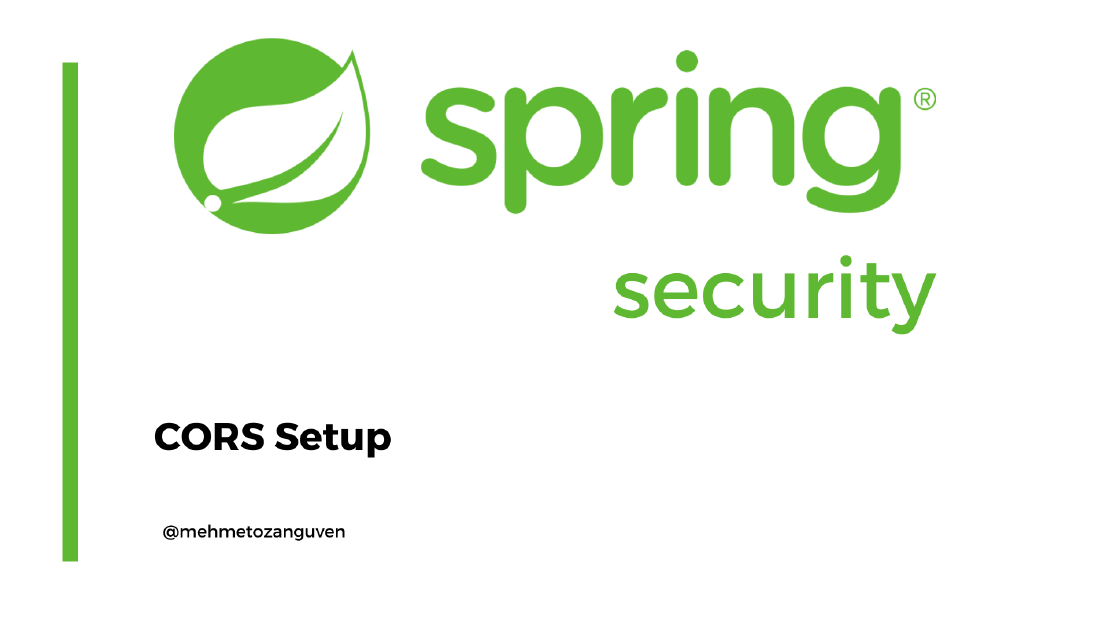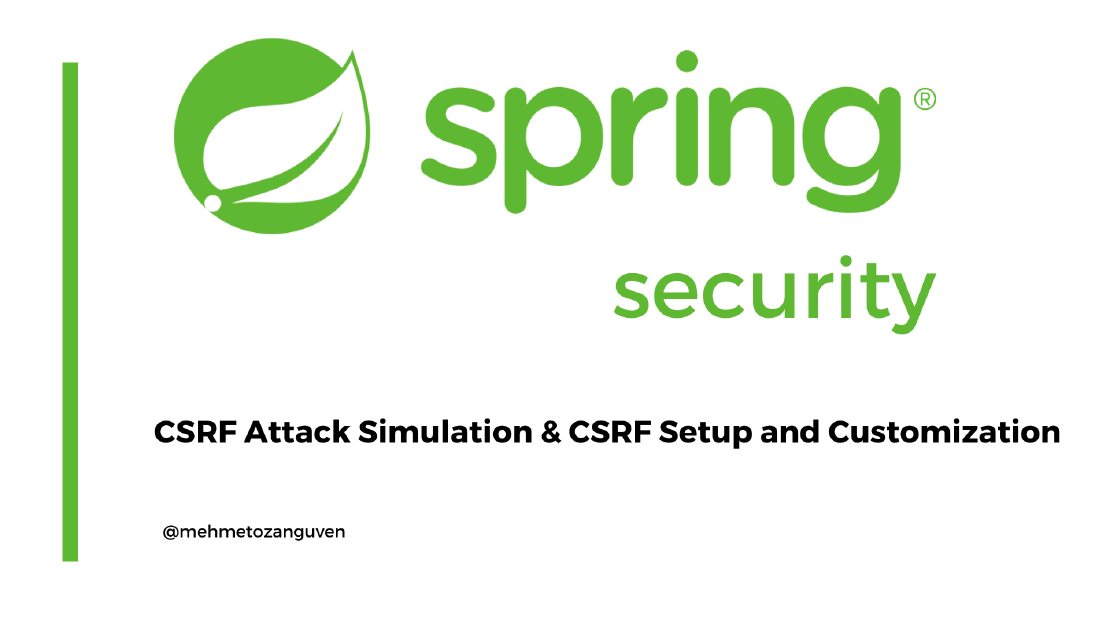
Spring Security -- 9) Spring Security CORS Setup
In this post, let’s find out what is the CORS policy, how to implement in the Spring Boot and Spring Security, finally how to resolve most …

In this tutorial, we are going to find location of your clients using spring boot and IP2Location and also we will look at how to update IP2Location database periodically with scheduling.
IP2Location is a non-intrusive IP location lookup technology that retrieves geolocation information with no explicit permission required from users.
Also IP2Location provides free to use geo-ip database.
If you only need to see the code, here is the github link
Go to https://lite.ip2location.com/ , and create an account. After that Ip2Location gives you a token and corresponding download url.
There are many databases in the Ip2Location. For this tutorial I chose the IP-COUNTRY database. (Database code = DB1.LITE)
After all your download url will be like this:
https://www.ip2location.com/download/?token={DOWNLOAD_TOKEN}&file={DATABASE_CODE}
Create a spring project with one dependency:
Search for ip2location-java component. Right now, latest version is 8.5.2. Add this dependency to your pom.xml
<?xml version="1.0" encoding="UTF-8"?>
<project xmlns="http://maven.apache.org/POM/4.0.0" xmlns:xsi="http://www.w3.org/2001/XMLSchema-instance"
xsi:schemaLocation="http://maven.apache.org/POM/4.0.0 https://maven.apache.org/xsd/maven-4.0.0.xsd">
<!-- ... -->
<properties>
<java.version>11</java.version>
<ip2Location.version>8.5.2</ip2Location.version>
</properties>
<dependencies>
<!-- ... -->
<dependency>
<groupId>com.ip2location</groupId>
<artifactId>ip2location-java</artifactId>
<version>${ip2Location.version}</version>
</dependency>
<!-- ... -->
</dependencies>
<!-- ... -->
</project>
You can use this util class to find out client’s ip address:
RequestContextHolderis class that holds the current web request within theRequestAttributesobject. You can get theRequestAttributesfrom anywhere in your code.
public class RequestUtils {
private static final String[] IP_HEADER_CANDIDATES = {
"X-Forwarded-For",
"Proxy-Client-IP",
"WL-Proxy-Client-IP",
"HTTP_X_FORWARDED_FOR",
"HTTP_X_FORWARDED",
"HTTP_X_CLUSTER_CLIENT_IP",
"HTTP_CLIENT_IP",
"HTTP_FORWARDED_FOR",
"HTTP_FORWARDED",
"HTTP_VIA",
"REMOTE_ADDR"
};
public static String getClientIpAddress() {
if (RequestContextHolder.getRequestAttributes() == null) {
return "0.0.0.0";
}
HttpServletRequest request = ((ServletRequestAttributes) RequestContextHolder.getRequestAttributes()).getRequest();
for (String header: IP_HEADER_CANDIDATES) {
String ipList = request.getHeader(header);
if (ipList != null && ipList.length() != 0 && !"unknown".equalsIgnoreCase(ipList)) {
return ipList.split(",")[0];
}
}
return request.getRemoteAddr();
}
}
First download the ip2location unzip the file.
Here is the my application.properties file:
app.external.resource.ip2-location.folder=/path/to/ip2Location
app.external.resource.ip2-location.token=yourTokenWillBeHere
app.external.resource.ip2-location.dbName=DB1LITEBIN
You can create class for ip2Location properties:
@Configuration
@ConfigurationProperties(prefix = "app.external.resource.ip2-location")
public class Ip2LocationProperties {
private String folder;
private String token;
private String dbName;
// getters and setters
}
While your service creating, you should read the ipLocation bin file.
import com.ip2location.IP2Location;
// ...
@Service
public class IpLocationServiceImpl {
public static final String FILE = "/IP2LOCATION-LITE-DB1.BIN";
private IP2Location ip2Location;
private final Ip2LocationProperties ip2LocationProperties;
public Ip2LocationServiceImpl(@Autowired Ip2LocationProperties ip2LocationProperties) {
this.ip2LocationProperties = ip2LocationProperties;
openIp2Location();
}
private void openIp2Location() {
String filePath = ip2LocationProperties.getFolder() + FILE;
this.ip2Location = new IP2Location();
try {
this.ip2Location.Open(filePath);
logger.info("Ip2Location loaded");
} catch (IOException e) {
logger.error("Can not open the ip2Location", e);
throw new RuntimeException("Can not open the ip2Location");
}
}
}
Ip2Location provides easy to use method to look up ip address’ location:
getCountryLong()return the country name based on ISO 3166.
@Service
public class IpLocationServiceImpl {
private static final Logger logger = LoggerFactory.getLogger(IpLocationServiceImpl.class);
// ...
public String findIpLocation(String ipAddress) {
try {
IPResult ipResult = ip2Location.IPQuery(ipAddress);
return ipResult.getCountryLong();
} catch (IOException e) {
logger.error("Error while ip lookup", e);
return "undefined";
}
}
}
I will create two endpoints. One of them is lookup for client’s ip location and the other one will find ip location based on the user’s input.
@RestController
@RequestMapping("/api")
public class IpLocationController {
private static final Logger logger = LoggerFactory.getLogger(IpLocationController.class);
private final MyIpLocation myIpLocation;
public IpLocationController(@Autowired @Qualifier("ip2Location") MyIpLocation myIpLocation) {
this.myIpLocation = myIpLocation;
}
@GetMapping("/myLocation")
public String findClientLocation() {
String clientIpAddress = RequestUtils.getClientIpAddress();
logger.info("Client ip address: {}",clientIpAddress);
return myIpLocation.findIpLocation(clientIpAddress);
}
@GetMapping("/findLocation/{ipAddress}")
public String findIpLocation(@PathVariable String ipAddress) {
return myIpLocation.findIpLocation(ipAddress);
}
}
When you are sending the request from your machine, you ip address will be localhost (loopback) address, for ipv6 => 0:0:0:0:0:0:0:1, and for ipv4 => 127.0.0.1. At the end ip2Location result will be:
curl http://localhost:8080/api/myLocation - # ip2Location result for localhost is just => `-`
If you want to test the other endpoint:
$ curl http://localhost:8080/api/findLocation/1.2.3.4
Australia
You should(or must) update ip2Location database periodically. You can do this via Schedule Job in spring boot.
I will use this dependency to download file from url to destination file.
<?xml version="1.0" encoding="UTF-8"?>
<project xmlns="http://maven.apache.org/POM/4.0.0" xmlns:xsi="http://www.w3.org/2001/XMLSchema-instance"
xsi:schemaLocation="http://maven.apache.org/POM/4.0.0 https://maven.apache.org/xsd/maven-4.0.0.xsd">
<!-- ... --->
<properties>
<java.version>11</java.version>
<ip2Location.version>8.5.2</ip2Location.version>
<apache.commons.io>2.8.0</apache.commons.io>
</properties>
<dependencies>
<!-- ... --->
<dependency>
<groupId>commons-io</groupId>
<artifactId>commons-io</artifactId>
<version>${apache.commons.io}</version>
</dependency>
</dependencies>
<!-- ... --->
</project>
Create a configuration class and enable the scheduling
@Configuration
@EnableWebMvc
@EnableScheduling
public class WebConfiguration implements WebMvcConfigurer {
}
My schedule job will run every two mins.
@Component
public class Ip2LocationSchedule {
private static final Logger logger = LoggerFactory.getLogger(Ip2LocationSchedule.class);
public static final String EACH_WEEK_ON_FRIDAY_AT_05_30 = "0 30 5 * * 5";
public static final String EVERY_TWO_MINS = "0 */1 * * * *";
private final Ip2Location ip2Location;
private final Ip2LocationProperties ip2LocationProperties;
public Ip2LocationSchedule(@Autowired Ip2Location ip2Location,
@Autowired Ip2LocationProperties ip2LocationProperties) {
this.ip2Location = ip2Location;
this.ip2LocationProperties = ip2LocationProperties;
}
@Scheduled(cron = EVERY_TWO_MINS)
public void downloadIp2LocationDatabase() {
final String methodName = "downloadIp2LocationDatabase";
logger.info("method: {}, scheduled job is running", methodName);
logger.info("Trying to download ip2location lite db");
// THIS PART RELATED TO THE HANDLERS
Ip2LocationDownloadHandlerObject handlerObject = new Ip2LocationDownloadHandlerObject();
Ip2LocationDownloadHandler downloadHandler = new DownloadIp2LocationBinFile(ip2LocationProperties);
Ip2LocationDownloadHandler unzipIp2Location = new UnzipIp2Location(ip2LocationProperties);
Ip2LocationDownloadHandler loadNewIp2Location = new LoadNewIp2LocationBinFile(ip2LocationProperties, ip2Location);
// CHAIN THE HANDLERS
downloadHandler.setNextHandler(unzipIp2Location);
unzipIp2Location.setNextHandler(loadNewIp2Location);
// RUN THE FIRST HANDLER
downloadHandler.handle(handlerObject);
}
}
To download and extract the ip2Location databases, I will create handler(s), and each handler represents only one action (for instance downloadHandler only download the ip2Location’s database, and pass the request to the nextHandler which is the zipHandler -unzip file the file- etc..)
Each handler will extends the abstract handler.
When handler is passing request to the next handler, all operation will be handled by the handlerObject. (All handlers will lookup the handlerObject for specific action(s))
public abstract class Ip2LocationDownloadHandler {
private Ip2LocationDownloadHandler nextHandler;
public abstract void handle(Ip2LocationDownloadHandlerObject handlerObject);
public Ip2LocationDownloadHandler getNextHandler() {
return nextHandler;
}
public void setNextHandler(Ip2LocationDownloadHandler nextHandler) {
this.nextHandler = nextHandler;
}
}
public class Ip2LocationDownloadHandlerObject {
private boolean isFileDownloaded;
private boolean isFileCanBeOpen;
public Ip2LocationDownloadHandlerObject() {
this.isFileDownloaded = false;
this.isFileCanBeOpen = false;
}
// getters and setters
}
Download the zip file to the new location and update the handlerObject to communicate with other handlers.
handlerObject.setFileDownloaded(true);means that other handlers can check the whether zip file downloaded or not. And other handlers can take action according to the this boolean value
public class DownloadIp2LocationBinFile extends Ip2LocationDownloadHandler {
private static final String url = "https://www.ip2location.com/download/";
private final Ip2LocationProperties ip2LocationProperties;
public DownloadIp2LocationBinFile(Ip2LocationProperties ip2LocationProperties) {
this.ip2LocationProperties = ip2LocationProperties;
}
@Override
public void handle(Ip2LocationDownloadHandlerObject handlerObject) {
try {
logger.info("Ip2 location download url: {}", generateDownloadUrl());
URL downloadUrl = new URL(generateDownloadUrl());
File destinationFile = new File(ip2LocationProperties.getFolder() + Ip2LocationServiceImpl.NEW_ZIP_FILE);
FileUtils.copyURLToFile(downloadUrl, destinationFile);
handlerObject.setFileDownloaded(true);
} catch (IOException e) {
logger.error("Could not download ip2Location bin file");
handlerObject.setFileDownloaded(false);
}
getNextHandler().handle(handlerObject);
}
private String generateDownloadUrl() {
// https://www.ip2location.com/download/?token={DOWNLOAD_TOKEN}&file={DATABASE_CODE}
return url + "?token=" + ip2LocationProperties.getToken() + "&file=" + ip2LocationProperties.getDbName();
}
}
After downloading the ip2Location, you should unzip it.
This handler creates new bin file from the recently downloaded ip2location
public class UnzipIp2Location extends Ip2LocationDownloadHandler {
private static final Logger logger = LoggerFactory.getLogger(UnzipIp2Location.class);
private final Ip2LocationProperties ip2LocationProperties;
public UnzipIp2Location(Ip2LocationProperties ip2LocationProperties) {
this.ip2LocationProperties = ip2LocationProperties;
}
@Override
public void handle(Ip2LocationDownloadHandlerObject handlerObject) {
Path zipFile = Path.of(ip2LocationProperties.getFolder() + Ip2LocationServiceImpl.NEW_ZIP_FILE);
Path newIp2Location = Path.of(ip2LocationProperties.getFolder() + Ip2LocationServiceImpl.NEW_FILE_PATH);
try {
ZipInputStream zis = new ZipInputStream(new FileInputStream(zipFile.toFile()));
ZipEntry zipEntry = zis.getNextEntry();
while (zipEntry != null) {
if (zipEntry.getName().contains(Ip2LocationServiceImpl.IP2_LOCATION_FILE_NAME)) {
Files.copy(zis, newIp2Location, StandardCopyOption.REPLACE_EXISTING);
logger.info("Correctly load new ip2location file");
}
zipEntry = zis.getNextEntry();
}
} catch (Exception ex) {
logger.error("Exception while unzipping ip2Location.zip", ex);
}
getNextHandler().handle(handlerObject);
}
}
That’s the last handler. It just only copies the new bin file to the existing one and reload the ip2Location
public class LoadNewIp2LocationBinFile extends Ip2LocationDownloadHandler {
private static final Logger logger = LoggerFactory.getLogger(LoadNewIp2LocationBinFile.class);
private final Ip2LocationProperties ip2LocationProperties;
private final Ip2LocationService ip2LocationService;
public LoadNewIp2LocationBinFile(Ip2LocationProperties ip2LocationProperties, Ip2LocationService ip2LocationService) {
this.ip2LocationProperties = ip2LocationProperties;
this.ip2LocationService = ip2LocationService;
}
@Override
public void handle(Ip2LocationDownloadHandlerObject handlerObject) {
if (handlerObject.isFileCanBeOpen()) {
File newBinFile = new File(ip2LocationProperties.getFolder() + Ip2LocationServiceImpl.NEW_FILE_PATH);
File currentBinFile = new File(ip2LocationProperties.getFolder() + Ip2LocationServiceImpl.FILE_PATH);
try {
FileUtils.copyFile(newBinFile ,currentBinFile);
ip2LocationService.reloadIp2LocationBin();
} catch (IOException e) {
logger.error("Can not copy the new bin file to the current bin file.", e);
throw new RuntimeException("Expected error for ip2location handler");
}
}
}
}
Last but not least, wait it for the next one.

In this post, let’s find out what is the CORS policy, how to implement in the Spring Boot and Spring Security, finally how to resolve most …

In this post, we are going to learn what CSRF(or XSRF) attack is, how to simulate csrf attack in spring and how to setup csrf protection in spring …